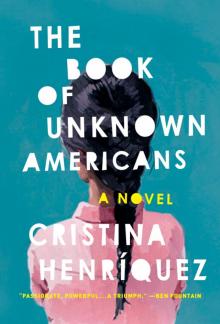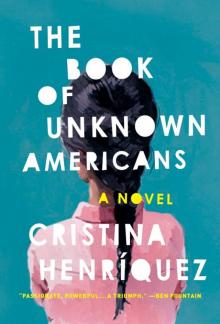- Home
- Cristina Henriquez
Come Together, Fall Apart Page 4
Come Together, Fall Apart Read online
Page 4
Armando is Argentinean, a different breed. We met six months ago when I was on my way out of work one afternoon, heading for the bus. He must have been standing there for hours, surveying every so-and-so who walked by. I’m not beautiful. I know that. I’m just this girl with my mother’s squash-shaped body, and dense black hair and a mole on my right cheek. But I always thought it meant something that he seized on me. Came right up to me and said, “You look like you could use a decent meal. Can I take you out?” He had on brown slacks and a white linen shirt. I brushed him off at first.
“What’s your name?” he asked.
“Mireya.”
He stopped in his tracks, playing. “That’s perfect,” he said. “The reservation is under Mireya.”
It was such a line. But I liked the idea of going someplace where we would need a reservation so I said yes.
We ended up at one of the best steakhouses in Panama City, a spot with gold doors that have an image of a bull carved into them. It was the first and last time we ever went out to a dinner like that. He paid for the whole thing and I ate a lot, as much as I could get in me. At the end of the meal he asked if he could sleep on my floor for a few nights. Told me that he’d just arrived in Panama and didn’t know anyone and he didn’t want to go back to Argentina because of some issue with his parents. I found out later it was money—his wealthy parents had finally told him he needed to find a job or get out. The idea of a job was distasteful to a person like Armando so he got out. He said he would pay me for a place on the floor, but he never did. And he promised to keep his hands to himself, but he didn’t do that either. But he seemed harmless enough at the time. So there, in the steakhouse, my belly warm and full, I said yes.
Carina, at work, says I only fell for him out of habit. The habit of seeing him every day. She says, “Imagine someone put a plate with a nice big pork chop on it in front of you. But you felt like a hamburger so you said no thanks. And then the next day they brought you a plate with the same big pork chop. And the next day and the next day. Eventually you would start wanting it, even though in the beginning you had no interest. Right?”
“Armando’s not a pork chop,” I say.
She shrugs. “At least a pork chop would feed you.”
Two days pass and I still can’t get myself together. It’s like a small, ferocious animal pounces on me every day, clawing at me, tearing me to shreds. I go outside on my break and sit on the concrete step behind Casa de la Carne by myself The ground is slick with grease, and mangy dogs sniff around my feet but I’m too ruined to care. When my time is over, I mop up my face and reassemble my hair into a ponytail.
I can’t stop thinking about the fact that my mother’s gone, though. It’s bad. I cut my finger twice on the slicer before lunchtime has even rolled around. When I tell them I don’t care and that I don’t want to wear the steel-mesh safety gloves while I cut, they send me home.
Armando’s on his back on the couch, his socked feet up on the arm, reading. The whole place smells like sweat from his socks.
“What are you doing here?” he asks, startled, when I come in.
“They sent me home.”
“You were fired?” He looks terrified.
For a second, I have this impulse to answer yes, to tell him he’s the one who has to find a job now, figure out a way to support us both, just to see what he would do.
I shrug. “They just sent me home.”
He purses his lips and looks away, like he’s weighing what this might mean.
“What? You have someone coming over?” I ask.
“No.”
He cheated on me once, when we first started, with this girl who had air-conditioning at her place. He told me it was because he liked to sleep there—no mosquitoes, no night sweats. He claimed it had nothing to do with her, but there were a few nights even during a blackout when he went over there, just the same. So. He might have left me for her at some point, I don’t know, but she moved to the United States anyway.
“I’m trying to finish this book by tomorrow,” he says, holding up what’s in his hand. “You won’t bother me, right?”
“I’m going to make lunch.” I raise my fingers to show him the bandages, but he’s already back to his book.
“Meatballs and patacones for me?” he asks hopefully. “Oh, and your papi called. I think it was him. He said it was him at first and then he kept saying he had the wrong number. The man is messed up, Mireya. You guys should put him in a hospital, you know?”
I glare at him as he reads. I unwrap the tape and gauze—pink with my blood—from my fingers, balancing them in my hand, and consider throwing them at him. But I don’t. I just leave them at his feet to see if he’ll even notice.
I call my father back later that night. Zenia answers. She’s never liked me. I think that when she and Jano first started together years ago, he told her not to trust me. My brother has always suffered from the belief that I came into the world to steal my parents’ attention from him. When I was younger, he claimed that for the entire ride to the hospital while my mother was in labor with me, she had shouted, “I don’t want it!” “You see?” he said. “Even then she knew you were a bad idea.” My mother heard him and swatted him on the arm so hard that a patch of red bloomed on his skin.
“Is my father there?” I ask.
“He’s having a good time here, you know.”
“Please, Zenia. I want to talk to him.”
She sighs. “Momentito.”
“Aló?” he says when he gets on the phone. “Who is this?”
“It’s Mireya.”
“La presidenta?”
“No. It’s me. Your daughter.”
It sounds like he’s chewing on something.
“How are you doing?” I ask.
“Fine. There’s a fan in my bedroom,” he says.
“What are you eating?”
“I’m drinking.”
“You’re chewing your drink?”
He’s quiet.
“Are you okay over there? Are you happy?”
“I miss you,” he says, and it’s so unexpected. I wonder if he even knows who he’s talking to.
“Me?”
“That fan makes a lot of noise, though.”
“I’ll tell Jano to fix it for you.”
“I used to live in my own house. Is that right?”
“Yes.”
He’s silent again.
“Do you want me to come visit you?” I ask.
My father was drunk almost every day while I was growing up. He was hardly around, a shadow of a father. It’s no secret that Jano and I hardened ourselves to him. But still, it’s amazing how much I want him to say yes.
“Our dinner is ready” he says instead.
“Okay, Papi.”
“We’re having arroz con pollo.”
“I’m going to get off now. I’ll see you in a few days.”
“Yes. It would be very nice to see the president.”
“Good-bye, Papi.”
When I show up at Casa de la Carne the next day, Carina pulls me aside and asks what I’m doing there. “I thought you got fired,” she says. I assure her I was just sent home early because of personal problems. She shakes her head at me, her gold hoop earrings swaying against her jaw. “No,” she says, drawing it out as if the word were a rubber band. “I think you should talk to Tino.” But as soon as she says it, I understand. I didn’t wear the gloves, which is a safety violation, which is a big deal. I was an idiot to think that they were just giving me some time off to pull myself together. Tino confirms it.
I don’t go home right away, though. I take the bus to my parents’ house. It’s on a sloping street where the houses press against one another, side by side, like children in a line holding hands. Theirs looks like all the others: a big cement patio out front, bars over the windows, wire trash bins held up on poles by the curb. I open the gate and step onto the patio. For some reason I’m feeling nervous, like I’m trespassing. Ev
en so, I’m doing okay until I notice the chair where I last saw my mother. The seat cushion is still flattened from her weight, the imprint of her bottom a depression in the foam. It splits my heart in two. I take a few deep breaths and make my way to the chair. Slowly, I lower myself into the impression she formed. The air is blistering, the sun piercing. I sit for as long as I can take it, and then I have to leave.
Memories are thin, watery and fragile like gas rising off the pavement on the hottest days. But there are times I can see clearly.
I was eight. We had driven to my Tía Cre’s house for a party. The boys abandoned us, locking themselves in a room doing who knows what, but no one asked because they were boys and anything was permissible. My cousin Juanita and I went down to the spiny shores of the bay, rooting around for snails and crabs in the small pools that gathered between the rocks. This was my mother’s favorite place. She was forever reminiscing about growing up in a house on the bay, about the days when she and Tía Cre spent their time among the rocks and on the crescent of sand at their base.
Juanita and I were barefoot, and the ocean rolled in far enough at times to lick the rocks until they glistened. I was stepping down from one rock to another when I slipped. My feet shot out in front of me and I fell backward. My spine hit the rock and my head snapped against a rough crest of stone. I must have blacked out for a few seconds. When I was conscious again, I reached up and felt the blood sticky in my hair. I had a gash like a long slug, just behind my ear. My cousin ran screaming to the house. I don’t remember much between then and when my mother arrived.
I saw her bending over me. I saw the sunlight filtering through her black hair, which curled under at the tips. There was a look of consternation on her face; she looked like she wanted to slap me but couldn’t bring herself to do it. She had a white apron around her waist—she must have been helping my Tia Cre in the kitchen—and I remember it flapping over me as she leaned down and scooped me up.
The blood stopped soon enough. My Tía Cre cleaned and bandaged me. The adults were worried and then not worried. My father looked at me blandly—he was drunk—and declared that I would be fine. Jano came out of the bedroom with a joystick in his hand, the cord stretching all the way across the floor. He peered at me and then walked away, shrugging. I think he thought I was just creating a show to get attention. To prove him wrong, I bit my lip to keep from crying. I haven’t cried in front of my family since.
In my cousin’s dark bedroom, the windows wide open and the curtains blowing, my mother stayed with me while the party went on. She climbed into bed and held me from behind.
“I’m not happy,” she said.
“I didn’t mean to do it,” I told her. My head throbbed.
“You aren’t allowed to leave me, you know.”
I could smell the vegetable oil and cooking gas that had crept into the fabric of her clothes and her hair.
“Everyone else can leave, but not you.”
My head stung, pain pulsing around me like a halo. I heard the muffled sounds of the party through the door—ice clinking into glasses, spontaneous riots of laughter, a faint thread of music. “I’m sorry,” I said.
She sighed and then pinched a bit of skin on my arm and twisted it. I knew then that she really had wanted to hit me back on the rocks. The pinch was a compromise.
“Be more careful,” she said. “From now on, you do that for me.”
The day before the funeral, I’m cruising around town on the bus. There’s not much else to do. Everyone still thinks I have a job so I have to leave the house during the day.
The bus is maybe a kilometer out when, through the window, I see Armando. From the back, but I can tell it’s him. He’s walking with his arm around a girl’s shoulder, her arm around his waist. She’s taller than me and her wrist is dripping with jewelry, expensive-looking stuff, the kind you could only get at a place like Mercurio. I get off at the next stop and walk back toward them.
I’m about ten meters away when Armando sees me. He drops his arm from the woman’s shoulder. “You’re not at work,” he says when I’m close enough.
“I don’t work there anymore.”
The woman next to him is wearing big, round sunglasses that are probably designer.
“What do you mean?”
“I just don’t” I stare unblinkingly at the woman as I say it. I can’t see her eyes, but I can see her eyebrows lift behind her sunglasses.
“Hey,” he says. It’s that soft “Hey” he gives me sometimes in the middle of the night when he wants to wake me because, he says, he misses me. He takes me by the arm and drags me a few steps away.
“Is that the same girl from before?” I ask. As soon as I say it, though, I realize I don’t want the answer. Either way, it’s bad.
He shakes his head.
“Who is she, then?”
“Mireya, please.”
“How long have you been with her?” I ask.
He shakes his head again.
“Tell me how long!”
“A few weeks, okay?”
“She’s rich?”
“She gives me what I need.” He looks defiant, suddenly. He’s over his shame or he’s pretending to be over it.
“I don’t? I go to work so you can eat!”
“Armando,” the woman calls.
That’s when I lay into him. Just sock him one in the chest. He stumbles back and the next thing I know I’m lunging at him, tearing into his pockets, grabbing hold of what I can. He clutches my wrists, trying to pry my hands away. But I want it—whatever he has, I want it. With both of us pulling, the seam of his pocket rips and he starts yelling at me to stop, but I won’t. He rams the top of his head against my shoulder, trying to create some distance between us. And somehow we end up on the ground, tiny pebbles pressing into my skin, the sidewalk baking underneath us. Faintly, I hear the woman saying “Ay, Dios,” again and again, and I catch glimpses of her towering over us as we fight. Finally, Armando manages to pull free of me and stand. I get up, too, and brush myself off
The woman says, “Armando, this girl is crazy.”
I’m a firestorm inside—everything exploding and burning—and I’m trying so hard not to talk because I know if I do, I’ll cry.
Armando tells the woman to wait at the corner. You can tell she’s not used to being instructed to do anything, especially not by him. But she does it.
It doesn’t help that eventually I would have left him anyway, or that anyone could have seen this coming.
We stare at each other, squinting in the sun. His face is light—he’s always been too pale for this country—and shiny with sweat. I can’t help thinking that there were moments when he was good to me. I wait for him to say something but he doesn’t. I feel weightless standing there, like I’m not sure if the soles of my shoes are connected to the sidewalk anymore.
“My mother was the only one in my family who liked you,” I finally say. It’s a petty impulse—wanting to hurt him because he hurt me—but I don’t care.
He looks like I just slapped him. “Your mother?”
I grab my bag from the ground and start walking away. I hear his shoes shuffle behind me for a second and then stop.
“What about you?” he yells. “Didn’t you like me?”
It’s such a heartbreaker. Because here’s the answer: Yes, I did. Who knows why, but I did.
The funeral is what it is. I kiss a hundred cheeks and listen to a hundred stories about what a wonderful person my mother was. Everyone’s asking where Armando is but I say again and again that I don’t want to get into it. Jano ran an obituary in the newspaper. He looks terrible, his nose red, his eyes swollen like little ravioli. Zenia, in a long-sleeved white dress, never leaves his side, her arm hooked through his. My father is seated in the front pew and I wave to him because I’m not sure what he would think if I hugged him.
When the time comes, I go up to say good-bye to her. When my grandmother died, I remember walking up the church aisle, grippin
g my mother’s hand. I was five. In my memory, the other people in the church are blurry, only watercolors. When my mother and I got to the casket, I could see my grandmother’s face—powdery and calm. I wanted so badly to touch her; I stood there forever thinking about doing it, but I didn’t think I was allowed. I didn’t want to do it and cause a scene, one that Jano would chide me for later. That afternoon I asked my mother if I could have done it. She told me of course. For all these years, I’ve hated the fact that I didn’t.
Now there’s no casket, just a gold urn on a small table. What can I do, reach my hand in? A photograph of my mother sits on an easel next to the urn. It’s black-and-white, all soft edges and haze. She is too young for me to recognize her. I wonder, if I hadn’t been her daughter, if I had just met this woman in the photograph on the street, would I have liked her? But it’s a stupid thing to wonder, because of course I would have. I would have loved her anytime.
When I’m done, I take a seat beside Papi. He smiles. His long, thin fingers are folded in his lap, and he looks as light and unbothered as a cloud.
“How are you?” I ask. I feel none of the anger I usually do around him.
“I tried to save her,” he whispers, leaning sideways.
“I know, Papi,” I say.
“Human beings can’t save each other from anything, though.”
“I’m sorry,” I tell him, because I don’t know what else there is to offer.
He nods. “Nothing to be sorry about.”

 The Book of Unknown Americans
The Book of Unknown Americans Come Together, Fall Apart
Come Together, Fall Apart The Book of Unknown Americans: A novel
The Book of Unknown Americans: A novel The World in Half
The World in Half